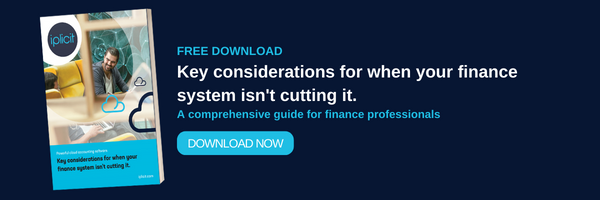When you know your finance software isn’t performing, the first consideration you need to make is, of course, what options are available to you.
It’s likely that you’ve started to shop around for a new finance management solution and discovered there’s apparently a lot of choice.
For many, this is the first barrier to progress.
Which do you choose? How can you possibly ascertain what’s best for you, your team and your business – not just for now, but for the foreseeable future?
Product selection is challenging, there’s no doubt about that. But it’s especially difficult when you aren’t armed with the facts.
Choosing new software will always require several phases of deliberation, but for the majority of users who are frustrated with their current solution, there’s only really one direction to go in. Once this is realised, delving deeper into the selection process becomes much easier.
If you’re looking to progress your finance operation, true cloud software is the only option for unrivalled flexibility, collaboration, security and long-term value. Let’s evaluate why this is the case in the vast majority of scenarios…
What is ‘true cloud’ software and how is it different?
In a nutshell, cloud technology refers to the use of remote servers to store and manage data. This data can be accessed from any internet-connected device, making it convenient and flexible. Cloud technology is often used in conjunction with other services, such as email and file sharing. This allows users to access their data from anywhere in the world, at any time.
True cloud technology will:
- Give you remote access to software at any time, from any location, on any device
- Provide you with software maintenance, security, updates, and backups that are all managed by the provider
- Be deployed quickly and easily, with a digital-first infrastructure.
However, the marketplace is saturated by an array of ‘fake cloud’ solutions.
These products could be adding to your deliberation and confusion, even though they will never be a suitable candidate to take your business further.
If a product has been adapted to suit cloud – rather than being cloud-first – it’s NOT cloud technology. This is what we mean by ‘fake cloud’.
But how do you spot fake cloud software, in order to avoid it?
Fake cloud (or a ‘hosted cloud solution’) is an on-premise product that has been adapted to work in a cloud environment. In the industry, this is often referred to as ‘SoSaaS’ – Same old Software as a Service!
You can identify a fake cloud product by these common attributes:
- Your data is stored in a private cloud
- You pay a hosting provider in order to run the application from off-premise servers
- You’re responsible for owning, maintaining, and upgrading your own software – as well as much of the security and virtual infrastructure
- Integration with other true cloud applications is either impossible or extremely cumbersome.
Because the infrastructure cost isn’t shared by other users, it’s more expensive. Integrations and customisations can be costly and complex to implement.
Ultimately, fake cloud doesn’t fit the bill for today’s fast-paced, flexible, and hybrid working model. Remove fake cloud from your potential options and you’ll compose a far more viable shortlist of potential solutions.
True cloud isn’t just the future… it’s the present. The innovators in your industry are already here.
Gartner predicts that the cloud will become the dominant deployment model across all areas of financial management applications by 2025.
If you aren’t keeping up, you’re at a competitive disadvantage:
- Your on-premise system means that staff can’t work remotely. You can only recruit in your local area, while competitors with cloud systems have the potential to recruit from anywhere in the world. While struggling with a known talent shortage, your business won’t be able to offer the advantages of hybrid working. Prospective talent will simply go to companies that can – and your existing talent could do the same.
- Competitors on cloud systems are doing more with less. By leveraging the latest technology, they can free up resources and deploy people on projects that will widen their market share. From reduced downtime to saving money on hosted solutions, competitors on cloud platforms have increased freedom to maximise their assets.
- Integrated systems are more efficient systems. Your competitors using the cloud are better equipped to connect all their systems into a seamless, virtual hub. It saves admin time, as well as reducing duplication and re-typing errors. They have accurate data to report on and more time to spend on what really matters.
Still, you may feel that switching to a cloud solution is a can that can be kicked down the road. After all, you’ve managed just fine until now, right? Does it really matter if you’re a late adopter?
The price of staying with a legacy system is far more detrimental to your business than the investment of switching to system that can truly empower it.
We know it all comes down to cost.
The cost of a new system, the cost of leaving the old one, the cost of training your staff… Before you commit, you need confidence that you’ll see a return, and fast.
Making the right decision doesn’t need to be a risk. In fact, we’ll help you to make sure it isn’t.

